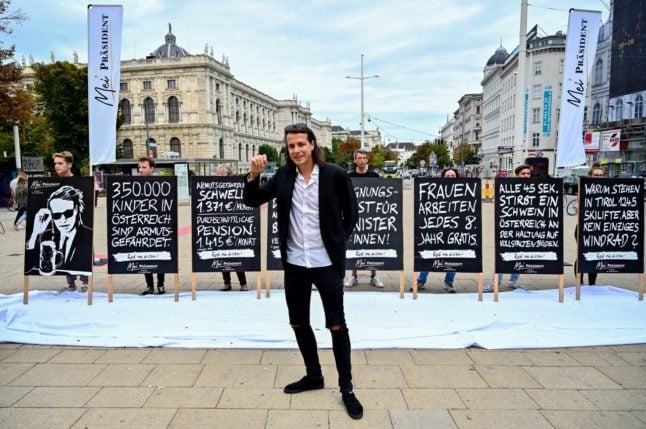With his distinctive long dark hair and rebellious torn jeans, punk rock singer Dominik Wlazny of Austria’s Beer Party has emerged as an intriguing candidate for the country’s next chancellor, just as he did when he ran for president—and surprisingly did better than expected.
Yet, Wlazny announced this Tuesday that the Beer Party will definitely be running in the national elections and seeks to reach a self-imposed funding target of €1.2 million. “Our glass is more than half full, and there is massive support,” he said at a short press conference.
Wlazny, who joked that his announcement would probably cause “gasps” at the other parties’ headquarters, did not answer any questions after his statement but announced another press conference next week with more details.
READ ALSO: How do Austrians elect their chancellor?
In almost all of the most recently published polls, the Beer Party would overcome the four percent hurdle, meaning Wlazny may not be the country’s next chancellor. Still, the protest party might grab seats in Austria’s National Council. The left-of-centre movement is likely to attract protest voters in particular and could be an unpleasant opponent for the SPÖ, Greens and KPÖ.
Wlazny’s previous electoral performance provides some insight into the Beer Party’s potential in the upcoming elections. In the 2022 presidential elections, the medical graduate, long known primarily as band leader Marco Pogo, came third with 8.3 percent of the vote and even came second in Vienna.
NATIONALRATSWAHL | Sonntagsfrage Market/DER STANDARD
FPÖ: 29%
SPÖ: 23% (+1)
ÖVP: 20% (-1)
NEOS: 10%
GRÜNE: 9%
BIER: 5%
KPÖ: 3%
Sonstige: 1%Änderungen zur letzten Umfrage vom 18. März 2024
Verlauf: https://t.co/roFKebZlfU#nrw #NRWahl pic.twitter.com/ULwJQCwiJN
— Österreich Wählt (@Wahlen_AT) April 29, 2024
Who’s behind the beer party?
The Beer Party, a satirical political movement, was founded in 2015 by Austrian comedian, doctor, brewer, and musician Dominik Wlazny, known by his stage name Marco Pogo. The party was a response to perceived corruption and a lack of transparency in Austrian politic, aiming to bring a fresh and unconventional approach to governance.
Wlazny studied medicine in Vienna and worked as a general doctor in a hospital before quitting in 2014 to focus on music.
Wlazny said that he was inspired by one of the songs played by the punk band he was a part of, which included the lyrics: ‘If you like to be fat and drink a lot every day, then vote for us now, the Beer Party, and we’ll abolish the alcohol tax.”
More serious proposals have slowly replaced the controversial party policies. When he ran for president, Wlazny said he would vet candidates proposed as ministers, making them go through a hiring process like in a company, to seek to avoid political chaos due to unfit leaders.
Currently, the president usually doesn’t reject the government’s choices.
“I often have the feeling that it’s harder to get an apprenticeship in Austria than a ministerial post,” Wlazny said at the time.
Wlazny also said that, as president, he would want to push for establishing a so-called “Future Ministry” to check the impact of policy decisions on security, the environment, health, and other sectors.
He said measures should have been taken decades ago to avoid the country’s dependence on fossil fuels, which hurts it now amid the ripple effects of Russia’s invasion of Ukraine.
READ ALSO: Why is support for Austria’s far-right FPÖ rising?
But what are the party’s program points?
There have been none so far. The Beer Party hasn’t made its National Council election promises public and hasn’t announced a party list, at least not yet.
Austrian political commentator Thomas Hofer told the newspaper Kurier that the strategy is clever: “As long as he doesn’t have a detailed program, Wlazny remains less vulnerable in terms of content—even if this is, of course, problematic in terms of democratic politics.”
There is also very little information on the party’s website. One page, called “menu,” holds some of the party’s general and superficial proposals, such as “active fight against child and family poverty,” “transparent and comprehensible rental price regulation,” “educational equality for all,” “expansion of the public transport network,” and more.
The party also claims women should have the “right to make decisions about their own body” and that small and medium enterprises are the “backbone of the economy” and a focus for the politicians.
Additionally, they advocate for “appropriate doctor/patient care ratio”, “environmentally friendly, sustainable energy policy for a climate-neutral Austria”, and “promotion of research and development”, among others.



 Please whitelist us to continue reading.
Please whitelist us to continue reading.
Member comments